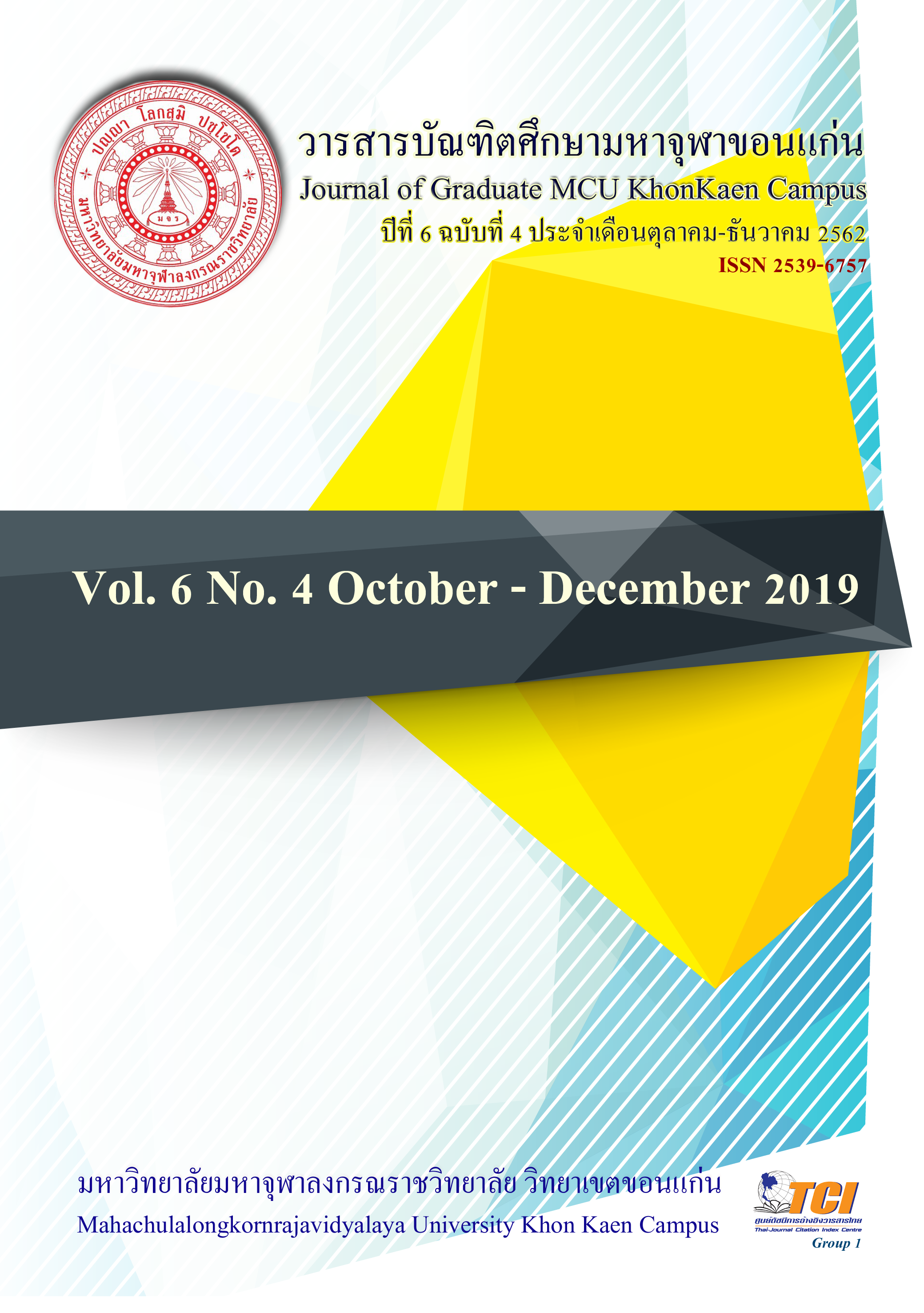Affiliate Marketing Strategies for sustainable self-reliance of Community Products Entrepreneur in Mae Hong Son Province.
Main Article Content
Abstract
This research aims to 1) for study self-reliance conditions and the factors that have the relation of community products entrepreneur and 2) for analyze the causal model for sustainable self-reliance of community products entrepreneur in Mae Hong Son province. The population of this research includes 500 for community products entrepreneur. Research instruments are questionnaire and interview, Chi-square analysis through AMOS, and content analysis from the real phenomenon Integrated with the element factor.
The research found that
- community product enterprises in Muang district Mae Hong Son province can manually operate their businesses successfully in the aspects of mentality, production pattern, environmental balance, economy, society, and culture. The factors related to self-reliance are natural resources, social and economic capital, local wisdoms, management system, external support, and personal conditions
- the characteristics of strategic marketing alliance affect the sustainable self-reliance at .42 the most, after that the characteristics of community product enterprises at .24 respectively
- the results for model of strategic marketing alliance for self-reliance, sustainable for entrepreneurial community products indicate the followings figures; Chi-square = 23.579, Chi-square/df = 1.474, df = 16, p = .099, GFI = .992, CFI = .998, RMR = .010, RMSEA = .031, NFI = .994
Article Details
How to Cite
Sasong, C. (2019). Affiliate Marketing Strategies for sustainable self-reliance of Community Products Entrepreneur in Mae Hong Son Province. Journal of Graduate MCU KhonKaen Campus, 6(4), 251–268. retrieved from https://so02.tci-thaijo.org/index.php/jg-mcukk/article/view/229142
Section
Research Article
References
Aunpong, T. (2007). An Analysis of the Potential of Textile Product Group under One Tambon One Product Project. In Chiang Mai. M.A. Independent Study (Economics). Chiang Mai University.
Babbie, E. (1973). Survey Research Methods. Belmont, California : Wadsworth Publishing Company.
Chadcham, S. (2008). Confirmatory element analysis. Journal of Educational Research and Measurement. 2(2): 15-42.
Chiwatakoonkid, B. (2014). Strategic Management for CEO. (11th ed.). Bangkok: P. Press.
Comrey, A.L. & Lee, H.B. (1992). A First Course in Factor Analysis. (2nd ed). Hillsdale, NJ: Lawrence Erlbaum Associates.
Dwyera, M. O. ,Gilmore, A. , & Carson, D. (2011). Strategic alliances as an element of innovative marketing in SMEs. Journal of Strategic Marketing. 19(1), 91–104.
Hair, J. F. , Black, W. C. , Babin, B. , Anderson, R. E. , & Tatham, R. L. (2006). Multivariate Data Analysis (6th ed.). Upper Saddle River, New Jersey : Prentice-Hall.
Kansawai. F. , Plujauen, N. , & Jamraman, V. (2012). The characteristics of entrepreneur successfully in hotel business sector in the lower northern region in Thailand. MIS Journal of Naresuan University, 7(1). 39-50.
Noknoi, C. , Boripunt, W. , & Lungtae, S. (2012). Key success factors for obtaining a one tambon one product food five-star rating in Phatthalung and Songkhla provinces. European Journal of Economics Finance and Administrative Sciences. 48 (May), 96-103. [in Thai]
Poosiri, P. ( 2007) . Self – Reliance of Community Enterprise: A Case Study of a ThapLan Women, s Weaving Group in PrachainBuri Province. Kasetsart Journal (Social Science), 28, 357-366.
Rovinelli, R. J. , & Hambleton, R. K. (1977). “On the use of content specialists in the assessment of criterion-referenced test item validity”. Dutch Journal of Educational Research, 2: 49-60.
Sanyawiwat, S. (2001). Self-reliance in moral economy, where series edition. Bangkok: Chulalongkorn University.
Sijanya, S. (2014). Creative Age Marketing 4.0. (2nd ed.). Pratoomtanee: DMS, Inc.
Tabachnick, B.G., & Fidell, L.S. (2007). Using Multivariate Statistics, Fifth Edition. Boston: Pearson Education, Inc.
Veerarangsan, A. , & Rujithamrongkul, K. (2018). A Development of the Causal Model of the Online Payment Service System Business. ACADEMIC JOURNAL BANGKOKTHONBURI UNIVERSITY, 7(2) : 37-53.
Babbie, E. (1973). Survey Research Methods. Belmont, California : Wadsworth Publishing Company.
Chadcham, S. (2008). Confirmatory element analysis. Journal of Educational Research and Measurement. 2(2): 15-42.
Chiwatakoonkid, B. (2014). Strategic Management for CEO. (11th ed.). Bangkok: P. Press.
Comrey, A.L. & Lee, H.B. (1992). A First Course in Factor Analysis. (2nd ed). Hillsdale, NJ: Lawrence Erlbaum Associates.
Dwyera, M. O. ,Gilmore, A. , & Carson, D. (2011). Strategic alliances as an element of innovative marketing in SMEs. Journal of Strategic Marketing. 19(1), 91–104.
Hair, J. F. , Black, W. C. , Babin, B. , Anderson, R. E. , & Tatham, R. L. (2006). Multivariate Data Analysis (6th ed.). Upper Saddle River, New Jersey : Prentice-Hall.
Kansawai. F. , Plujauen, N. , & Jamraman, V. (2012). The characteristics of entrepreneur successfully in hotel business sector in the lower northern region in Thailand. MIS Journal of Naresuan University, 7(1). 39-50.
Noknoi, C. , Boripunt, W. , & Lungtae, S. (2012). Key success factors for obtaining a one tambon one product food five-star rating in Phatthalung and Songkhla provinces. European Journal of Economics Finance and Administrative Sciences. 48 (May), 96-103. [in Thai]
Poosiri, P. ( 2007) . Self – Reliance of Community Enterprise: A Case Study of a ThapLan Women, s Weaving Group in PrachainBuri Province. Kasetsart Journal (Social Science), 28, 357-366.
Rovinelli, R. J. , & Hambleton, R. K. (1977). “On the use of content specialists in the assessment of criterion-referenced test item validity”. Dutch Journal of Educational Research, 2: 49-60.
Sanyawiwat, S. (2001). Self-reliance in moral economy, where series edition. Bangkok: Chulalongkorn University.
Sijanya, S. (2014). Creative Age Marketing 4.0. (2nd ed.). Pratoomtanee: DMS, Inc.
Tabachnick, B.G., & Fidell, L.S. (2007). Using Multivariate Statistics, Fifth Edition. Boston: Pearson Education, Inc.
Veerarangsan, A. , & Rujithamrongkul, K. (2018). A Development of the Causal Model of the Online Payment Service System Business. ACADEMIC JOURNAL BANGKOKTHONBURI UNIVERSITY, 7(2) : 37-53.

